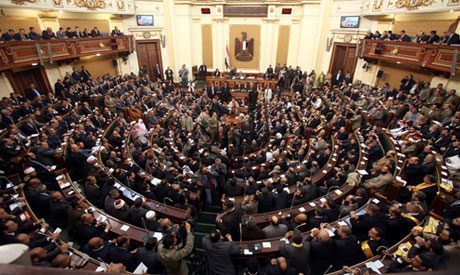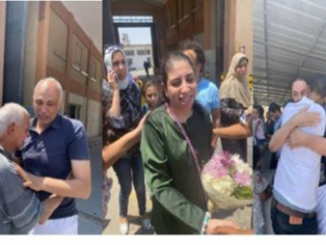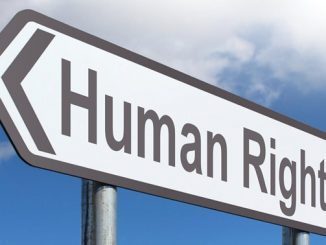The Portuguese RTB channel focused on many issues but one of the major issues which was tackled by the channel was the human rights violations in Egypt which was totally denied by al-Sisi.
In al-Sisi’s interview with the Portuguese RTB TV channel, he denied the presence of emergency law in Egypt.
In the interview, al-Sisi was asked about emergency law in Egypt but he replied saying,” We deal with normal circumstances and there is no emergency law in Egypt.”
But it seems that al-Sisi replies as if people around the world are living in a vacuum unconnected to the world with internet and social media networks that enable them to access any information in less than a second.
It is true that Egypt doesn’t impose emergency law, but it has counter-terrorism law that is more repressive than the former emergency law.
It is noteworthy that Egypt adopts counter-terrorism law which has been described by Human Rights Watch as a law that “erodes basic human rights.”
Abdel Fattah al-Sisi enacted the terrorism law on August 15, 2015.
Human Rights Watch released a report at that time that said,” The new counterterrorism law increases authorities’ power to impose heavy sentences, including the death penalty, for crimes under a definition of terrorism that is so broadly worded it could encompass civil disobedience.”
Nadim Houry, the deputy Middle East and North Africa director, said that “With this sweeping new decree, al-Sisi has taken a big step toward enshrining a permanent state of emergency as the law of the land.”
He added, “The government has equipped itself with even greater powers to continue stamping out its critics and opponents under its vague and ever-expanding war on terrorism.”
Moreover, Egyptian human rights groups have strongly criticized the Terrorist Entities Law for relying on an ambiguous definition of terrorism similar to the broad one included in the new counterterrorism law.
The new Law 95 of 2015 for Confronting Terrorism largely maintains a wide definition of terrorism in Egypt’s penal code.
Under this definition, a “terrorist act” encompasses any “use of force or violence or threat or terrorizing” that aims, among other things, to: “Disrupt general order or endanger the safety, interests or security of society; harm individual liberties or rights; harm national unity, peace, security, the environment or buildings or property; prevent or hinder public authorities, judicial bodies, government facilities, and others from carrying out all or part of their work and activity.”
According to HRW,” Such a framework far exceeds a definition of terrorism that the United Nations Security Council unanimously adopted in 2004 and that the UN special rapporteur on counterterrorism and human rights subsequently endorsed.”
” That definition says that terrorism is an act committed with the intent to kill, cause serious bodily injury, or take hostages with the aim of intimidating or terrorizing a population or compelling a government or international organization,” said HRW.
In addition , Joe Stork-HRW deputy director in the Middle East and North African Division -said,”Sending Egyptians to prison for simply exercising their rights to freedom of expression and peaceful assembly is likely to become more extensive under the new “terrorist entities” decree.”
He added,” It defines “terrorist” in extraordinarily broad terms: in addition to language about violence and threats of violence, the law covers any offense that in the view of authorities “harms national unity” or the environment or natural resources, or impedes work of public officials or application of the constitution or laws. A “terrorist” is anyone who supports such an entity – support that can include “providing information.”
Stork continued,” Imagine the dragnet that can be cast if “providing information” that “impedes the work of public officials” or “application of the Constitution” constitutes a terrorist offense.
In the interview , al-Sisi denied the presence of 20,000 or 10,000 or even 5,000 detainees in Egypt’s prisons. He also added that the number doesn’t exceed 500 prisoners.
Since al-Sisi led a military coup in 2013 against Egypt’s first democratically elected president Mohamed Morsi, the Egyptian authorities have engaged in one of the widest arrest campaigns in the country’s modern history, targeting a broad spectrum of political opponents.
According to Human Rights Watch and local rights groups,” Between June 2013 and May 2014, Egyptian authorities arrested or charged at least 41,000 people, and 26,000 more may have been arrested since the beginning of 2015.”
Al-Sisi also refused the term of unfair trials in Egypt and he claimed that the judiciary system in the country is an independent authority.
It is worth mentioning that Amnesty International stated in its annual report of 2015-2016 that “The criminal justice system continued to serve as an instrument of state repression, with courts convicting hundreds of defendants on charges such as “terrorism”, “unauthorized protesting”, engaging in political violence and belonging to banned groups, after grossly unfair mass trials in which prosecutors did not establish the individual criminal responsibility of the defendants.”
It added that, “At least 3,000 civilians stood trial before unfair military courts on “terrorism” and other charges alleging political violence. Many, including leaders of the Muslim Brotherhood, were tried in mass trials. Military trials of civilians are fundamentally unfair.”
Despite various reports about torture in Egypt’s prisons, Al-Sisi claimed that there is no torture in Egypt’s prisons, during his interview with the Portuguese channel.
Regarding the Scorpion Prison reports, al-Sisi said that he has seen the reports and he ensured that he doesn’t allow any form of torture in this prison saying that, “It is illegal and forbidden.”
In this context, Human Rights Watch has released a recent report titled:”We are in Tombs: Abuses in Egypt’s Scorpion Prison” which highlights how the Egyptian authorities routinely abuse inmates in ways that may have contributed to the death of some of them.
The notorious Scorpion Prison which is known as the “Scorpion Cemetery” is a maximum security prison in Cairo that holds many political prisoners.
According to the 80-page report, “Staff at Scorpion Prison beat inmates severely, isolate them in cramped “discipline” cells, cut off access to families and lawyers, and interfere with medical treatment.”
In addition, prisoners are treated by the officers of Egypt’s Interior Ministry in a cruel and inhuman way that probably amounts to torture in some cases and violates basic international norms for the treatment of prisoners.
The abuse in Scorpion, where inmates are held in cells without beds or items for basic hygiene, has persisted with almost” no oversight from prosecutors and other watchdogs, behind a wall of secrecy kept in place by the Interior Ministry,”said the report.
Joe Stork, the deputy Middle-East and North Africa director at Human Rights Watch, said: “Scorpion Prison sits at the end of the state’s repressive pipeline, ensuring that political opponents are left with no voice and no hope.” He added,”Its purpose seems to be little more than a place to throw government critics and forget them.”
Stork said,”Egypt’s detention system is overflowing with critics of the government.” He added,”Ending the abuses at Scorpion is a small step toward improving dire conditions across the country.”



